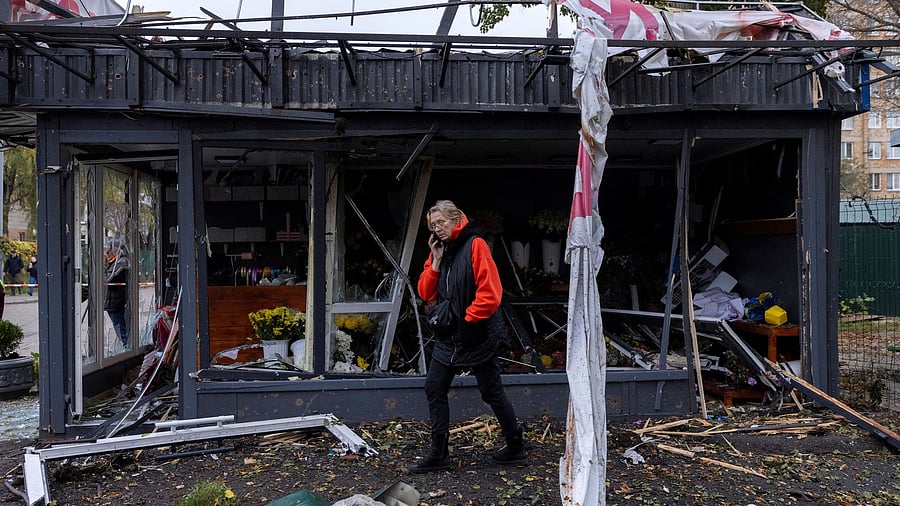
A woman inspects the damage to a shop after a Russian drone strike, amid Russia's attack on Ukraine, in Kyiv, Ukraine October 29, 2024.
Credit: Reuters Photo
Moscow/Seoul: North Korea's foreign minister arrived in Russia on Tuesday for talks as the Russia-Ukraine war appeared to take a dangerous new turn, with NATO and South Korea expressing alarm that North Korean troops could soon be joining in on Moscow's side.
NATO said on Monday that thousands of North Korean troops were moving toward the front line.
The development has alarmed Kyiv, which has said sanctions would not be enough and called for more weapons and an international plan to keep the North Korean troops at bay.
South Korea, which remains technically at war with the nuclear-armed North decades after the 1950-1953 Korean War, also condemned the deployments, with officials in Seoul particularly worried about what Russia may be providing to Pyongyang in return.
North Korean Foreign Minister Choe Son Hui arrived in Russia's far east on Tuesday on her way to Moscow, Russian state media said. Russian state news agencies said it was not clear who Choe, making her second visit in six weeks, would meet in Moscow.
The Kremlin said Putin had no plans to meet her.
Ukraine's President Volodymyr Zelenskyy spoke with South Korean President Yoon Suk Yeol on Tuesday and said the North Korean moves were sending the war into an unprecedented phase.
"The conclusion is clear - this war is becoming internationalized, extending beyond two countries," Zelenskyy said on X.
Yoon told Zelenskyy that if North Korea receives aid from Russia and is able to glean military experience and knowledge from its involvement in the war it would pose a "great threat" to South Korea's security, according to a statement from South Korea's presidential office.
South Korea has said it may start supplying weapons to Ukraine if North Korean troops joined Russia's war. The Pentagon also said on Monday it would not impose new limits on Ukraine's use of US weapons if North Korea entered the fight.
Russian President Vladimir Putin has not denied the presence of North Korean troops in the country.
What role the North Korean troops may play is unclear. Analysts say their small number and possibly limited capabilities are unlikely to be decisive, but they could shore up Russian forces by providing manual labor or manning defensive positions.
They are also likely to play a political role for Russia and North Korea, strengthening their hands in relations with China, which has an uneasy partnership with both countries, and sending a message to Washington and its allies, Western diplomats and analysts said.
"The closer Moscow's ties to Pyongyang, the more leverage it expects over U.S. allies as well as China," Gilbert Rozman, of The Asan Forum, wrote for the US-based 38 North programme.
Moscow needed a partner hostile to the status quo, wary of China but unwilling to antagonize it, and helpful in meeting arms or perhaps labor needs, he said.
A few thousand North Korean troops will not change the course of the war so it may be a Russian attempt to underscore to the United States just how disruptive Moscow can be if it wants to be, said one diplomat who spoke on condition of anonymity.
"Integrating North Korean troops into a very complex war machine is not easy. But using their presence to scare the United States and its allies in Asia is quite simple," the diplomat said. "The key question is: to what extent is Russia actually changing its whole post-Soviet approach to North Korea?"
Troops training
The Ukraine conflict broke out when Russia invaded its neighbor in February 2022 and has since developed into a war of attrition largely fought along front lines in eastern Ukraine, with huge numbers of casualties on both sides.
The Pentagon estimated 10,000 North Korean troops had been deployed to eastern Russia for training, up from an estimate of 3,000 troops last Wednesday.
The military in Russia was trying to teach military terminology to the North Korean soldiers, South Korean lawmakers briefed by the country's spy agency said on Tuesday.
Moscow was also continuing to provide technical support for North Korea's attempts to field a fleet of spy satellites, the lawmakers said.
For months North Korea has been providing Russia with short-range ballistic missiles, artillery shells, and other weapons, according to intelligence officials in the United States, South Korea, and Ukraine.
Putin has said it is Russia's business how to implement a partnership treaty he signed with North Korean leader Kim Jong Un in June, under which the two countries agreed to support each other if one of them came under attack.
South Korea has yet to change its stance against openly providing weapons to Ukraine, but Seoul expedited plans to share intelligence with NATO and dispatched a senior delegation to brief officials in Brussels and Kyiv.